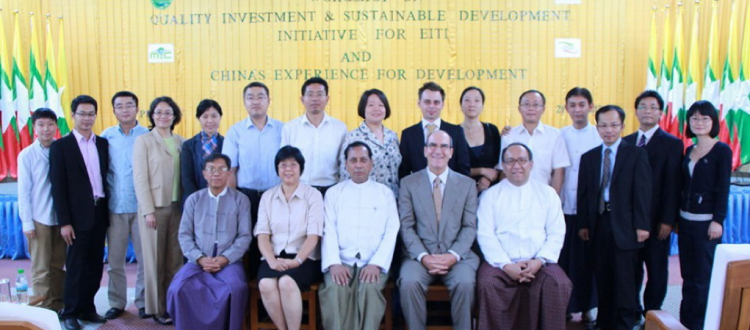Myanmar and China Seek Cooperation on Sustainable Investment and Development
YANGON (Aug. 21-23, 2012) – Building up bilateral cooperation on sustainable investment and development, Myanmar Development and Resources Institute (MDRI) and Global Environmental Institute (GEI) jointly held two workshops from August 21-23 in Myanmar.
The “Workshop on Quality Investment and Sustainable Development” was held in Myanmar on August 21 and welcomed Vice Minister of the Myanmar Ministry of Railways, Thura U Thaung Lwin. Then, the “Investment and Governance: Policy and Law Selection for Realizing Sustainable Development” was held on August 23, 2012.
Both workshops welcomed American, Burmese and Chinese experts to give their perspectives on methods for building up sustainable society in Myanmar. Adding to the diversity of nationalities, the representatives hailed from government, non-government, academic and industry backgrounds.


The workshops gathered together diverse multilateral stakeholders for discussions and sharing – GEI 2012
Overall, the workshops’ goals were to provide enterprises, government officials and NGO representatives within Myanmar an overview of the experiences of other countries, especially China, in the formulation of foreign investment law, establishing special economic zones (SEZs), as well as experiences in balancing environmental and social needs and sustainable development with economic development.
The topic is a timely once. In fact, since, the democratically elected government of Myanmar took office in March of 2011, the country has been actively promoting economic reforms. Myanmar is currently developing foreign investment law, and plans to establish three special economic zones in Kyaukpyu, Thilawa and Dawei.
Keynote speakers and distinguished guests at the August 21 workshop include:
The six esteemed keynote speakers represented esteemed institutions such as the Chinese Academy of International Trade and Economic Cooperation, the National Development and Reform Commission (NDRC) Institute of Spatial Planning and Regional Economy, the State Environmental Protection Administration (SEPA) Appraisal Center for Environmental Engineering, the Chinese Academy of Science and Technology for Development and the Nanning-ASEAN Economic Development Zone Investment Promotion Bureau. Tin Maung Than, director of the MDRI Economic and Social Development Center, and experts from the University of Vermont Law School as well as Georgetown University also spoke.
Keynote speakers and distinguished guests at the August 23 workshop include:
U Myint and U Set Aung, economic advisers to the President of Myanmar; U Win Aung, the Chairman of the Union of Myanmar Federation of Chambers of Commerce and Industry (UMFCCI); Houyuan Xing, the Vice President of the Chinese Academy of International Trade and Economic Cooperation; Yijing Huang, Deputy Secretary of the Nanning-ASEAN Economic Development Zone Investment Promotion Bureau; Professor Michael Gadbaw, Georgetown University; Martin Cosier, University of Vermont Law School.
The 20 participants represented UMFCCI and NGOs had lively discussions and exchanges related to attracting foreign investment, developing foreign investment law, opportunities and challenges faced during the construction of special economic zones, sustainable development, and the experience of the international community conducting similar works, especially China.

Background – Myanmar Establishes Environment Cooperative Body
At the GEI workshop focusing on strengthening Sino-Burmese cooperation around sustainable development, Burmese officials announced the establishment of the Myanmar Council for International Cooperation on Environment and Development (MCICED). This workshop was held March 28, 2011 in Yangon, Myanmar.
The primary purpose of the workshop was to expand the knowledge and capacity of business leaders and civil society to craft a strategy for resource saving and building environment-friendly and involved 80 leaders in business, academic, and media sectors, but also international non-governmental organizations (NGOs).
Participants agreed that forming a working group and advisory committee for the establishment of the Council would be an effective and fundamental step in the Council’s evolution; thereby, building the path for environmental, economic, and social sustainability in Myanmar Vice President of the Union of Myanmar Federation of Chambers of Commerce & Industry (UMFCCI), Mr. Zaw Min Win, delivered the workshop’s opening remarks.
He expressed his gratitude to GEI and the organizing committee for providing Myanmar with the opportunity to gain knowledge from the experiences of China in finding solutions to the country’s environmental concerns.

